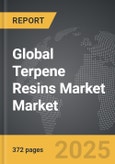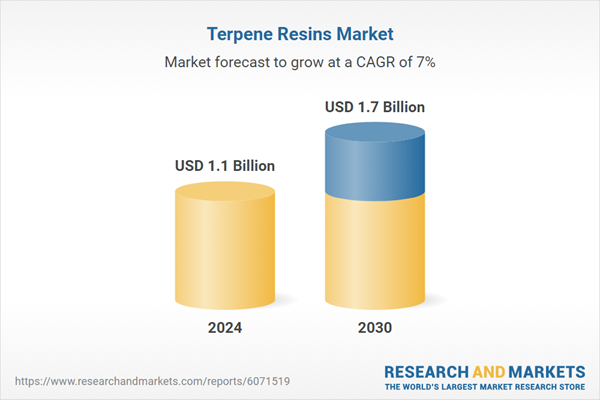Global Terpene Resins Market - Key Trends & Drivers Summarized
Are Natural-Based Resins Like Terpenes Becoming the Future of Industrial Formulations?
As sustainability and environmental regulations become central to industrial strategy, terpene resins - derived primarily from pine trees and citrus fruits - are emerging as a preferred alternative to synthetic petrochemical-based resins. Terpene resins are a family of natural hydrocarbon resins commonly used in adhesives, coatings, inks, rubber, and other performance-enhancing formulations due to their excellent tack, solubility, thermal stability, and compatibility with other resins and polymers. Their low toxicity and biodegradable nature position them as eco-friendly additives in a market increasingly dominated by green chemistry mandates. Demand has surged across a range of industries, particularly where volatile organic compound (VOC) restrictions are tightening and the shift toward renewable raw materials is accelerating. Manufacturers in packaging, automotive, construction, and consumer goods are actively integrating terpene resins into product lines to enhance environmental profiles without sacrificing performance. In addition to their physical properties, terpenes offer intrinsic advantages such as strong odor-masking capabilities and natural antimicrobial properties, making them highly suitable for both industrial and consumer applications. As circular economy initiatives push for alternatives to petroleum-based inputs, terpene resins are proving to be a resilient and scalable bio-based solution with cross-sectoral impact.Why Are Adhesives, Inks, and Coatings Driving the Surge in Terpene Resin Demand?
One of the most dynamic end-use segments fueling the terpene resins market is adhesives, particularly hot-melt adhesives (HMAs), pressure-sensitive adhesives (PSAs), and solvent-based systems. Terpene resins provide superior tack, cohesive strength, and aging resistance, making them ideal for labels, tapes, automotive interior components, and flexible packaging. The packaging industry, in particular, has embraced terpene resins to meet demand for food-safe, sustainable, and high-performance adhesives. In the printing and coatings sector, terpene phenolic resins enhance gloss, drying speed, and pigment compatibility, especially in offset and flexographic inks. Their excellent solubility in various solvents makes them suitable for diverse ink formulations used in industrial, commercial, and decorative applications. In the rubber industry, terpene resins act as tackifiers and performance modifiers, improving compound flexibility and adhesion in tires and conveyor belts. Additionally, construction sealants and paints now incorporate terpene-based resins to improve workability, environmental compliance, and durability. As consumer awareness of chemical exposure rises, producers of household adhesives, paints, and finishes are marketing terpene resin-based formulations as safer, low-emission alternatives. These performance benefits, combined with the ability to align with green labeling and certification standards, are making terpene resins indispensable to industries that straddle both functionality and environmental accountability.Can Technological Advances Expand Terpene Resin Capabilities Beyond Traditional Uses?
The capabilities of terpene resins are being significantly enhanced by ongoing R&D and advances in process engineering, which are opening new avenues for innovation and application. Modified terpene resins - such as terpene phenolic, terpene-rosin esters, and hydrogenated terpene resins - are now engineered for improved UV resistance, color stability, and compatibility with synthetic polymers. These developments are allowing terpene resins to penetrate technically demanding applications such as electronics encapsulation, 3D printing materials, and specialty coatings. Hybrid resin systems combining terpene bases with acrylics, polyesters, and other synthetic backbones are also being developed to offer customized performance profiles across industries. Moreover, biotechnology is playing a growing role in terpene production, with microbial fermentation and enzymatic processes being researched to yield high-purity terpenes with reduced environmental impact. Analytical techniques such as gas chromatography and NMR spectroscopy are improving quality control, enabling consistency and traceability across batches - crucial for pharmaceutical, cosmetic, and food-contact applications. Advanced blending and emulsion technologies are making terpene resins more compatible with water-based systems, opening up new applications in environmentally sensitive product lines. These innovations not only expand the technical capabilities of terpene resins but also support their scalability, helping industries transition toward renewable raw material usage without compromising on performance or efficiency.What Are the Primary Factors Fueling the Growth of the Terpene Resins Market?
The growth in the terpene resins market is driven by several factors directly linked to material innovation, environmental policy shifts, and evolving consumer and industrial demands. A central growth driver is the global push toward sustainable and biodegradable materials, with terpene resins offering a viable and high-performance alternative to petrochemical tackifiers and binders. Regulatory pressure to reduce VOC emissions and adopt REACH- and FDA-compliant ingredients in adhesives, inks, and coatings is also encouraging manufacturers to substitute conventional resins with terpene-based solutions. The expanding use of HMAs and PSAs in packaging, automotive, and hygiene products has increased the demand for tackifiers with strong bonding capabilities, thermal stability, and environmental acceptability - all of which terpene resins offer. Emerging markets in Asia-Pacific, Latin America, and the Middle East are investing in domestic adhesive and coating production, creating new opportunities for terpene resin suppliers. The growing popularity of clean-label and green-certified consumer goods is also prompting cosmetic, personal care, and food packaging industries to seek bio-based, naturally derived ingredients - further expanding terpene resin's end-use applications. Technological improvements in extraction and synthesis methods are enhancing production scalability, lowering costs, and improving product uniformity. Additionally, strategic collaborations between chemical companies, packaging firms, and sustainability-focused brands are accelerating the commercial integration of terpene resins. Together, these trends are forging a robust growth pathway for terpene resins, positioning them as essential materials in the next generation of sustainable product development.Report Scope
The report analyzes the Terpene Resins market, presented in terms of market value (US$). The analysis covers the key segments and geographic regions outlined below:- Segments: Product Type (Solid Terpene Resins, Liquid Terpene Resins); Grade (Industrial Grade, Technical Grade); Application (Inks & Coatings Application, Adhesives & Sealants Application, Chewing Gums Application, Pulp & Paper Application, Plastic & Rubber Application, Leather Processing Application, Other Applications).
- Geographic Regions/Countries: World; United States; Canada; Japan; China; Europe (France; Germany; Italy; United Kingdom; Spain; Russia; and Rest of Europe); Asia-Pacific (Australia; India; South Korea; and Rest of Asia-Pacific); Latin America (Argentina; Brazil; Mexico; and Rest of Latin America); Middle East (Iran; Israel; Saudi Arabia; United Arab Emirates; and Rest of Middle East); and Africa.
Key Insights:
- Market Growth: Understand the significant growth trajectory of the Solid Terpene Resins segment, which is expected to reach US$1.2 Billion by 2030 with a CAGR of a 8%. The Liquid Terpene Resins segment is also set to grow at 4.6% CAGR over the analysis period.
- Regional Analysis: Gain insights into the U.S. market, valued at $305 Million in 2024, and China, forecasted to grow at an impressive 11.2% CAGR to reach $355 Million by 2030. Discover growth trends in other key regions, including Japan, Canada, Germany, and the Asia-Pacific.
Why You Should Buy This Report:
- Detailed Market Analysis: Access a thorough analysis of the Global Terpene Resins Market, covering all major geographic regions and market segments.
- Competitive Insights: Get an overview of the competitive landscape, including the market presence of major players across different geographies.
- Future Trends and Drivers: Understand the key trends and drivers shaping the future of the Global Terpene Resins Market.
- Actionable Insights: Benefit from actionable insights that can help you identify new revenue opportunities and make strategic business decisions.
Key Questions Answered:
- How is the Global Terpene Resins Market expected to evolve by 2030?
- What are the main drivers and restraints affecting the market?
- Which market segments will grow the most over the forecast period?
- How will market shares for different regions and segments change by 2030?
- Who are the leading players in the market, and what are their prospects?
Report Features:
- Comprehensive Market Data: Independent analysis of annual sales and market forecasts in US$ Million from 2024 to 2030.
- In-Depth Regional Analysis: Detailed insights into key markets, including the U.S., China, Japan, Canada, Europe, Asia-Pacific, Latin America, Middle East, and Africa.
- Complimentary Updates: Receive free report updates for one year to keep you informed of the latest market developments.
Some of the 33 companies featured in this Terpene Resins market report include:
- Alfa Chemistry
- Arakawa Chemical Industries, Ltd.
- BOC Sciences
- ChemPoint (Univar Solutions Inc.)
- DRT (Les Dérivés Résiniques et Terpéniques)
- Eastman Chemical Company
- Foreverest Resources Ltd.
- Foshan Baolin Chemical Industry Co., Ltd.
- Guangdong KOMO Co., Ltd.
- Guangzhou Ecopower New Material Co., Ltd.
- Haihang Industry Co., Ltd.
- Ingevity Corporation
- Kraton Corporation
- Lawter Inc.
- Mangalam Organics Limited
- Mentha & Allied Products Pvt. Ltd.
- Neuchem Inc.
- Pinova Holdings, Inc.
- Privi Organics India Limited
- Qingdao Hwalong Chemical Co., Ltd.
This edition integrates the latest global trade and economic shifts into comprehensive market analysis. Key updates include:
- Tariff and Trade Impact: Insights into global tariff negotiations across 180+ countries, with analysis of supply chain turbulence, sourcing disruptions, and geographic realignment. Special focus on 2025 as a pivotal year for trade tensions, including updated perspectives on the Trump-era tariffs.
- Adjusted Forecasts and Analytics: Revised global and regional market forecasts through 2030, incorporating tariff effects, economic uncertainty, and structural changes in globalization. Includes historical analysis from 2015 to 2023.
- Strategic Market Dynamics: Evaluation of revised market prospects, regional outlooks, and key economic indicators such as population and urbanization trends.
- Innovation & Technology Trends: Latest developments in product and process innovation, emerging technologies, and key industry drivers shaping the competitive landscape.
- Competitive Intelligence: Updated global market share estimates for 2025, competitive positioning of major players (Strong/Active/Niche/Trivial), and refined focus on leading global brands and core players.
- Expert Insight & Commentary: Strategic analysis from economists, trade experts, and domain specialists to contextualize market shifts and identify emerging opportunities.
Table of Contents
Companies Mentioned (Partial List)
A selection of companies mentioned in this report includes, but is not limited to:
- Alfa Chemistry
- Arakawa Chemical Industries, Ltd.
- BOC Sciences
- ChemPoint (Univar Solutions Inc.)
- DRT (Les Dérivés Résiniques et Terpéniques)
- Eastman Chemical Company
- Foreverest Resources Ltd.
- Foshan Baolin Chemical Industry Co., Ltd.
- Guangdong KOMO Co., Ltd.
- Guangzhou Ecopower New Material Co., Ltd.
- Haihang Industry Co., Ltd.
- Ingevity Corporation
- Kraton Corporation
- Lawter Inc.
- Mangalam Organics Limited
- Mentha & Allied Products Pvt. Ltd.
- Neuchem Inc.
- Pinova Holdings, Inc.
- Privi Organics India Limited
- Qingdao Hwalong Chemical Co., Ltd.
Table Information
| Report Attribute | Details |
|---|---|
| No. of Pages | 372 |
| Published | February 2026 |
| Forecast Period | 2024 - 2030 |
| Estimated Market Value ( USD | $ 1.1 Billion |
| Forecasted Market Value ( USD | $ 1.7 Billion |
| Compound Annual Growth Rate | 7.0% |
| Regions Covered | Global |









